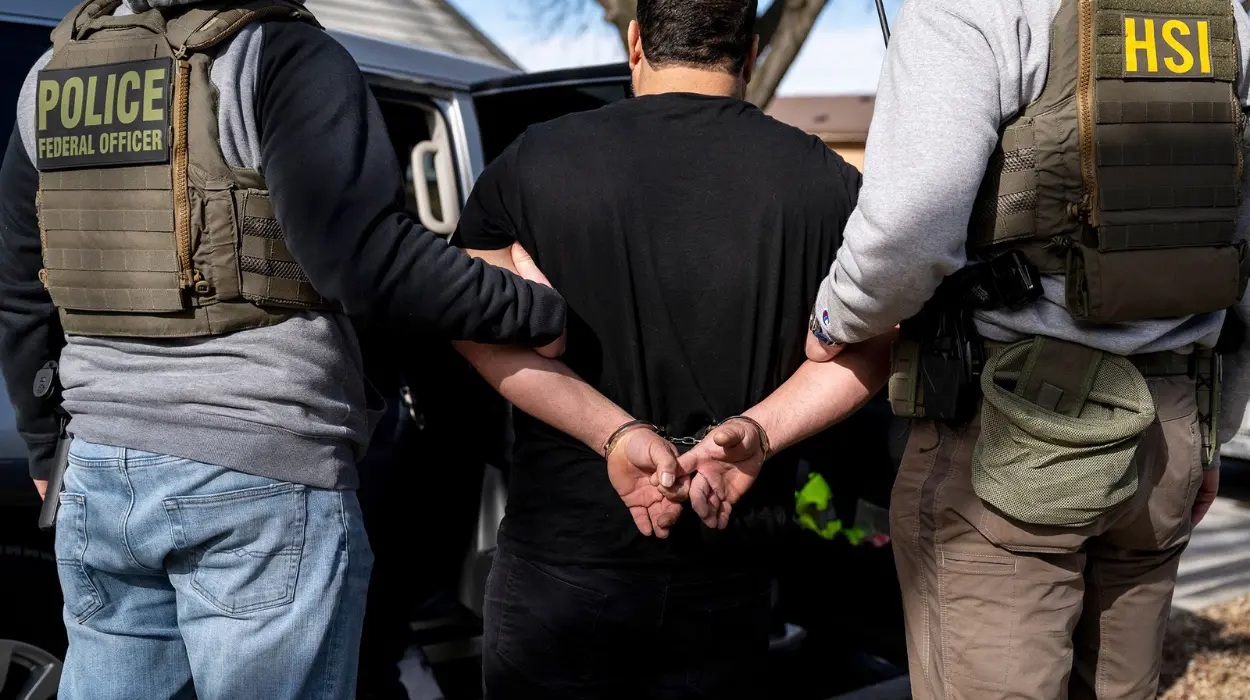January to June of 2025 has been the period of a sudden increase in the pace of US immigration enforcement activities; it is one of the identifying characteristics of the second term of president Donald Trump. The federal agencies, especially the Immigration and Customs Enforcement (ICE), have increased their activities all around the country making significant arrests and large-scale deportations utilizing a renewed policy of concentrating on toughness. African migrants despite their disproportionately small portion of the illegal immigrant community have become one of the worst hit constituencies in this policy revival.
According to the ICE data, more than 1,500 African migrants were arrested in January to June 2025, a considerably high number as compared to those caught in the last years. These arrests are part of a larger crackdown, as ICE allegedly takes aim at as many as 3,000 people per day in order to reach their own performance objectives. But most detainees are those with no criminal records. According to the government, over 65 percent of immigrants held at ICE custody were not convicted and only 8.5 percent linked to brutal offences as of May 2025. Such enforcement policy has also attracted increasing criticism among civil rights organizations and immigrant rights activists due to its widespread nature and racial trends.
The Disproportionate Impact on African Migrants
Structural Racism and the Prison-to-Deportation Pipeline
Although the number of black immigrants makes up just about 5.4 percent of the undocumented people in the United States, the number that gets deported on criminal interests constitutes over 20 percent. This is grim overrepresentation that can be attributed to a larger trend of Black immigrants, and particularly Africans, facing excessive policing attention and being more prone to joining what can be described as the pipeline of prison to deportation. Daily brushes with the police, typically on the basis of small crimes, may become a sluiceway into immigration detention, even where there is basic lack of a danger to any person.
The report of the Thurgood Marshall Institute of the year 2025 suggests the structural issues that affect the population of Black and African migrants. The report notes that racial profiling, disproportionately severe consequences in prosecution, and access to legal resources are the items connected to African nationals. These circumstances compound their precariousness in the US system of immigration and promote social inequality that does not limit itself to legal status.
Enforcement Trends Targeting African Communities
According to field reports, ICE has extended its sphere of operation into African neighborhoods of migrants and their frequent in-roads include through traffic stops and neighborhood patrols. Community agitators observe that this has bred a generation of fear and silences where the residents are restricting their contacts with the authorities even during the most dangerous times due to the fear of immigration repercussions.
This trend also indicates cultural incompetency in the enforcement practices. African migrants who speak less widespread languages and cannot be considered well-versed in the rights through a wide literacy of the current law or African migrants, have even more issues with comprehending or expressing their rights when dealing with the police.
Operational and Legal Frameworks Driving Arrest Patterns
Expanded Authority and Dismantling of Sanctuary Protections
The policy actions of the Trump administration since January 2025 have enabled ICE with a greater leeway to carry out arrests in what were regarded as sensitive areas, such as schools, hospitals, and places of worship. This erosion of sanctuary immunity has opened the door to a much larger group of detainees and now any undocumented migrant can be under threat of being detained no matter their record of criminal activity.
Legal commentators remark that this exercise of policing is justified by vigilance promulgations and backed up by resurrected explanations of statutes like the Alien Enemies Act. The administration’s openness to using facilities like Guantanamo Bay for detention further illustrates the national security framing applied to immigration—a framing critics argue is increasingly divorced from actual risk assessments.
Legal System Constraints and Disparities
African migrants also face profound legal disadvantages once in the immigration system. Courts often lack language services tailored to African dialects, and migrants frequently appear without legal counsel. The weight placed on police referrals—many stemming from discretionary stops—means that initial contact with law enforcement can be both misleading and legally determinative.
Detainee overcrowding adds to the procedural chaos. In April 2025, ICE was reporting beds being run at over 140 percent of congressional capacity, causing hearings to be delayed, detainment extended, and legal backlogs. Such system efficiencies increase the danger of removal in error especially by migrants who do not receive representation.
Societal and Community Impacts of Targeted Enforcement
Economic and Psychological Toll
The arrest and detention of African migrants does not only affect individual lives, it is carried through families, in the work place and at a community level. The direct repercussions entail loss of job opportunities and eviction as well as separation of the dependents. The increased arrests in industries based on immigrant workers such as hospitality and agriculture have led to the reported labor shortages and delay in operations.
The psychological cost is also very high. The consequences of fear of detention and deportation comprise the development of constant distress and suspicion of institutions as well as withdrawal. According to community leaders, there is also a growing feeling by African migrants that they are becoming invisible amidst the more popular case brought up in the mainstream immigration movement, which feature stories focused more on Latin American immigrants.
Barriers to Support and Advocacy
The uniqueness of cultures, language seclusion, and low institutional contact have rendered most of the African migrants inaccessible, to the most relevant services. This obscurity sabotages the efforts being made to integrate the populace and renders communities ill prepared in overcoming legal or humanitarian issues. Organizations that target the African migrants notice the increasing demands, although there is a shortage of funds and resources.
The arrest habits have further fueled disbelief in the institutions of immigration enforcement, and thus, making it difficult to foster healthy relationships between the police force and the community that is critical in the prevention of crime as well as social trust.
Policy Debates and Public Opinion
Evolving Public Sentiment and Calls for Reform
While early 2025 polling showed majority support for strict immigration measures, by midyear, public opinion began to shift. Media coverage of indiscriminate arrests and family separations fueled growing unease. Lawmakers across several states introduced proposals to curtail ICE’s authority and expand legal access for detainees, though progress has been uneven due to political polarization.
Civil rights groups and Black immigrant coalitions continue to press for targeted reforms, including the decriminalization of immigration infractions, bolstered legal defense funds, and alternatives to detention rooted in community supervision models.
Legal Safeguards and Legislative Outlook
Multiple legal challenges are pending in federal courts over the constitutionality of expanded enforcement zones and the denial of due process. Advocates argue that without legislative intervention, enforcement will continue to outpace accountability. Bills under consideration in Congress aim to cap daily detentions, require ICE transparency, and prohibit removals based solely on minor offenses—but prospects remain uncertain amid partisan divides.
Expert Insights and Forward-Looking Perspectives
Tasha Ruraltarain, a migration policy specialist, recently addressed the issue on social media, noting that
“the eruption of arrests among African migrants in 2025 exposes the intersection of immigration policy and systemic racial inequities, demanding urgent policy reform and community-focused solutions.”
When we say South Africans generally respect other countries' laws & they travel with valid passports and permits.
— Kwena Molekwa (@Miz_Ruraltarain) January 20, 2025
This is why we will never understand why people don't want to return our goodwill not come to our country illegally.
There's no single South African that has… pic.twitter.com/45VTzP9RqQ
Her remark summarizes a bigger issue of immigration law enforcement which does not differentiate between those who overtly pose criminal threat and those who are already disadvantaged by social vulnerability.
The following stages of forming the policies will depend on the willingness of the federal agencies and civil society to discuss the priorities, legal norms and racial equity in a good faith dialogue. With the immigration an ongoing theme of national politics, the issue of how the African migrants are being treated will serve as one of the rule-of-thumb on whether the system has been formed to further the cause of justice or whether it has been used to cause inequality.
The future pattern of the African migrant arrests in the United States in 2025 is an interesting example of the clash of the enforcement mandates and the very roots of democracy. Today, as a nation struggles with the issues of inclusion, legality, and fairness, the consequences of all these enforcement measures are bound to resonate way beyond the confines of prison and centres; resounding and affecting the way US imagines itself as people of law, rights, and mutual obligation in an increasingly globalised world.





